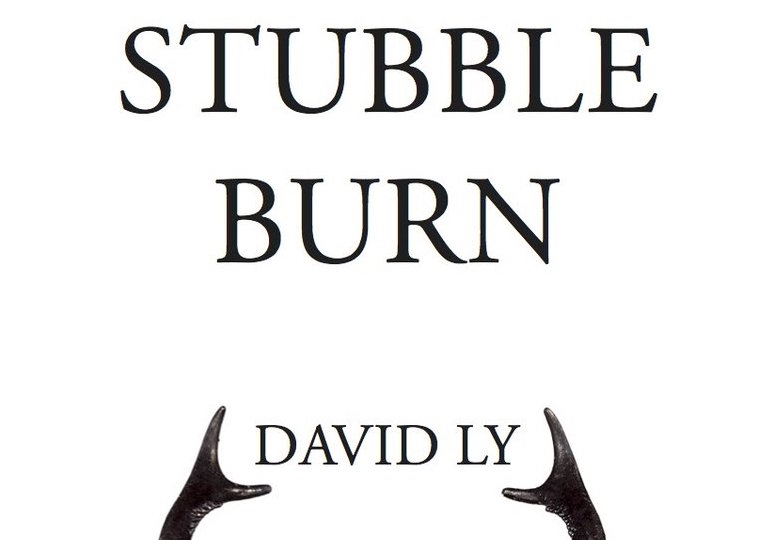
Stubble Burn
David Ly
Anstruther Press
Review by Kai Cheng Thom
The gay male body is razor wit and iridescent verse in David Ly’s Stubble Burn, the debut chapbook of an exciting and necessary voice in Canadian literature. Rooted in the lineage of Asian North American gay poetry (“gaysian” poetry to those in the know), Ly’s piercing yet wry, sexy style is at once reminiscent of the late, great Justin Chin and decidedly its own.
Comprised of twelve spare, intense poems, Stubble Burn is a prism through which Ly breaks open gay masculinity as through breaking white light into a rainbow. One by one, each piece teases out shades of ecstasy, tragedy, racism, cruelty, beauty, and narcissism in gay sex culture to reveal a messy humanity within. Ly evades the tendency of many of his contemporaries to either glamourize or demonize gay sex, instead showing us a more nuanced portrait of what it means to be young, gay, and in lust. In the chapbook’s titular poem, for example, Ly writes:
He helps you
finish with a bite here, here, here.
I’m your rice queen slips through
his teeth and you swallow salty
love. If cum splatters can be
read like tea leaves yours are
shaped like black beetles.
Ly deftly interrogates the ambiguous borders of violence, consent, pain, and pleasure in these poems. More often than not, he brings a touch of sharp humour to his observations, shedding light on the inherent cruelty and ridiculousness of gay sex culture. In “Another Message Received,” Ly quotes an anonymous Grindr user:
you’re only desired when they lust
for a vacation in the land that is your skin
eager to gorge themselves on yr oriental noodle.
In the tradition of “gaysian” poetry, Stubble Burn makes use of the author’s sexual and racialized experiences to reveal painful truths about gay masculinity – in particular, the toxic vanity, exclusion, and exploitation experienced by those who do not conform to white, patriarchal standards of male beauty. Ly hits these notes with pitch-perfection, managing to be evocative without coming across as self-indulgent or whiny. At its tenderest and most vulnerable, Ly’s work is no less than a love letter to
that closeted Asian boy
daydreaming into the night for rooftop parties
with endless daiquiris when he finally has enough courage
to come out.
Yet, the intricate, meticulously considered language of Stubble Burn also belies a poetic strength and psychological depth that is hidden below the surface. Ly’s thematic interest in monsters, beetles, predatory animals, and other such inhuman imagery works best when he gives himself the space to take these metaphors to their logical conclusion, as in the stunning “Because I Am”:
because I hear they like
boys smooth and submissive
with almond-shaped eyes
who dance right into their claws
because now I am because
He ate my heart and then he ate my brain
because at times
I am a monster dissecting what I am.
When Ly allows his metaphorical language to run wild, he achieves a strength of image and emotion that speaks to a searing vision of human relationships. At times, however, the frame of Stubble Burn’s material setting – gay bars, nightclubs, Grindr, Tinder, Instagram – feels unnecessarily confining, bound as it is to the emotional and narrative context of hook-up culture. In those moments, the speaker(s) of Ly’s poems seem trapped in the beginning of a story of which there is much more to tell.
Stubble Burn is the beginning, one imagines, of many things: an intriguing and fruitful literary career for Ly, and also of a conversation between queer poets of various racial identities and generations. Where previous “gaysian” poets asked the question, what about me? in response to white gay male self-obsession, work such as Ly’s moves the dialogue forward by asking, what shall I become? In so doing, Ly speaks to the existential crises not only of queer people of colour, but of masculinity in general at time when men of all kinds are being challenged to look within themselves and recognize both the monstrous and the divine that live there.
The poems in Stubble Burn are intelligent and challenging – which is to say, they are exactly what we need right now.
Kai Cheng Thom is a writer, performance artist, and psychotherapist in Toronto. Her novel Fierce Femmes and Notorious Liars: A Dangerous Trans Girl’s Confabulous Memoir was released by Metonymy Press in 2016, and her first poetry book, a place called No Homeland, was published by Arsenal Pulp Press in 2017. Her children’s picture book From the Stars in the Sky to the Fish in the Sea, illustrated by Kai Yun Ching and Wai-Yant Li, was also published by Arsenal in the fall of 2017. Kai Cheng won the Writers’ Trust of Canada’s Dayne Ogilvie Prize for LGBTQ Emerging Writers in 2017.